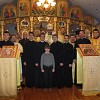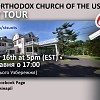SAINT SOPHIA
UKRAINAIN ORTHODOX THEOLOGICAL SEMINARY
PRESS RELEASE
Visiting and Celebrating as One Family in Christ!
By Subdeacon Vasyl Pasakas
As the Holy Orthodox Church commemorated the feast day of the Meeting of the Lord on February 15, 2012 (Julian Calendar), the seminarians of St. Sophia Ukrainian Orthodox Theological Seminary of the Ukrainian Orthodox Church of the USA traveled to Lehigh Valley, PA to participate in the Archpastoral Divine Liturgy with His Grace Bishop Daniel at the Protection of the Mother of God (St. Mary) Ukrainian Orthodox Cathedral in Allentown, PA – Very Rev. Mitered Fr. Myron Oryhon, pastor.
Several dozens of Ukrainian Orthodox Christians from the Dormition of the Birth-Giver of God Ukrainian Orthodox parish in Northampton, PA (Very Rev. Fr. Bazyl Zawierucha – pastor) and the parishioners of Allentown’s Ukrainian Orthodox Cathedral gathered together with the hierarch of the Church to celebrate the feast that commemorates the event that took place on the fortieth day after our Lord’s birth - the God-Infant was taken to the Jerusalem Temple. According to the Law of Moses (Lev. 12:2-8), a woman who gave birth to a male child was forbidden to enter the Temple of God for forty days. At the end of this time the mother came to the Temple with the child, to offer a young lamb or pigeon to the Lord as a purification sacrifice. The Most Holy Virgin, the Mother of God, had no need of purification, since she had given birth to the Source of purity and sanctity without defilement. However, she humbly fulfilled the requirements of the Law.
The bishop in his sermon shared the historical background and the multidimensional character of the feast. Bishop Daniel accurately pointed out that “… on the fortieth day after the Nativity of the Infant God, another meeting also occurred—the Old Testament church and the Church of the New Testament. All the Gospel stories are penetrated with the motif of the precise fulfillment of the Law of Moses: the forty-day period of purification prescribed by Leviticus, the dedication of the first-born son to God (Num. 3:13), and His symbolic ransom (Ex. 13:13). Nevertheless, it is easy to see that the spiritual center of the events described is carried over into New Testament history. Now (Lk. 2:20) means that the time awaited by many generations for the Messiah has come. Holy righteous Simeon speaks of his departure from this world, while his speech is filled with praise and thanksgiving to God for fulfilling the time of the promise. According to patristic tradition, the holy Prophet Zachariah, father of St. John the Forerunner, placed the Most Holy Virgin—who came according to the law to fulfill the ritual— not in the place for women who come for purification, but in the place of virgins (married women were not allowed to stand there). When the scribes and Pharisees began expressing their displeasure, Zachariah announced that this Mother remains a Virgin and pure, even after giving birth: “Therefore I have not removed this Mother from this place appointed for virgins, because She is higher than all virgins.”
The bishop also spoke of the “personal” character of the feast. For Elder Simeon, the day had come for which he had waited unusually long. It was promised to him that he would see the Savior of the world, born of an Ever-Virgin. Righteous Simeon, distinguished by his extraordinary honesty, a wise man who knew the Divine Scriptures well, labored together with seventy-two translators on the island of Pharos off Alexandria in the 380’s BC, translating the Old Testament from Hebrew into Greek. As he was translating the book of the Prophet Isaiah, he came to the words, behold, a virgin shall conceive in the womb, and shall bring forth a son (Is. 7:14). Reading this, he doubted, supposing that it is impossible for a woman to give birth without a husband. Simeon took a knife and wanted to scrape these words from the scroll, to change the word “virgin” into “woman”. But at that moment an angel of the Lord appeared to him, took his hand, and said, “Have faith in the words written, and you yourself will see their fulfillment, for you shall not see death before you shall see Christ the Lord, born of a pure Virgin.” Believing the angel’s words, Elder Simeon impatiently waited for Christ’s coming into the world, and he led a righteous and pure life. According to tradition, Elder Simeon was vouchsafed a blessed repose in the 360th year of his life. His holy relics were translated during the reign of Emperor Justinian the Younger (565–578) to Constantinople and placed in the altar of the Holy Apostle James, in the church of the Agiosoritissa.
Dozens of faithful of the Ukrainian Orthodox parish communities of Lehigh Valley, PA received the Most Holy Eucharist from the hands of the hierarch of the Church, who called upon them to bear the light of Christ in the world that poses economic, social and moral challenges.
The day concluded with a prayerful visit to St. Tikhon’s Orthodox Theological Seminary in South Canaan, PA where Bishop Daniel, escorted by Very Rev. Fr. Bazyl Zawierucha, a pastor of the Dormition of the Birth-Giver of God Ukrainian Orthodox parish in Northampton, PA and the Academic Dean of St. Sophia Ukrainian Orthodox Theological Seminary in South Bound Brook, NJ as well as Very Rev. Fr. Myron Oryhon, a pastor of the Protection of the Birth-Giver of God Ukrainian Orthodox Cathedral in Allentown, PA and Subdeacon Vasyl Pasakas visited the student-seminarian Subdeacon Theophan Mackey and his family of St. Anthony of the Desert Ukrainian Orthodox Mission in Las Cruses, NM of the Western Eparchy of the UOC of the USA that studies at St. Tikhon’s Orthodox Theological Seminary. The bishop, as well as the Academic Dean of St. Sophia Seminary spent a few hours with Subdeacon Theophan learning about his academic and spiritual formation. Bidding farewell to the subdeacon and his family the bishop emphasized to Subdeacons Vasyl and Theophan the importance of academic and spiritual formation stating "... that Without holiness, the ministry is merely a social function. The quality of your future ministry depends on the quality of your relationship with God, on your sacrifices, on the right integration of the requirements of your current formation.”
|
| |||||||||||




